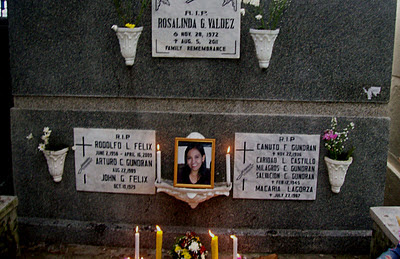I VISITED Manila South Cemetery for the first time since the funeral a little less than three months ago. I went there on Sunday, October 30, two days earlier than the actual date of the nationwide commemoration for the dead (November 1 or 2), with my three children, my mother-in-law, and a sister-in-law in tow. I just wanted to avoid the mad rush in the area and the unnecessary festivities and maddening commercialization of the memorial day.
It was a beautiful afternoon, bright and
windy, unlike on the day of the funeral where it was gloomy and dark with rain. But the first time
I went to her grave I felt like the day we put her to rest. No doubt, the overall grief and all it's triggers and nostalgia were there. But unlike some months before, I didn’t allow myself to be overwhelmed by a paroxysm of grief. My eyes, though, were dried. Well, it just felt so weird, like it was not happening again, but I
must accept, just like the way I accept all the realities that came into my
life now. No more self-pity or misery, that is, if I can.
I did not come to my wife’s grave to
grieve for her loss, but to communicate with her. Visiting and speaking with
her reinforced this feeling that she is still here in my heart. It helped a lot to
say all the things that I wish that I had said to her during her suffering,
especially my regret about my helplessness to save her. Rosalie’s death was so
sudden and unexpected that I find the need to talk with her, to have such harsh
reality finally sink in and try to bury this sadness in the graveyard.
I’ve read a story about a man who would
take a beach chair to the cemetery every morning with his coffee.
There he would sit, drink the coffee, and have a lengthy conversation with his
wife. This might sound crazy but, yes, the man had a good purpose: to express
himself out, albeit in the quietude of his grief. But I couldn’t be like this
man. I just wanted this day, this very first visit, to tell my wife all I
wanted to say. I repeated over and over in my mind how sorry was I, and how
much I love her and really miss her.
I could feel her while I was at her graveyard (which she shared
with her father and other departed relatives), blankly staring at the depressing headstone with her name on it. I wanted to believe she
actually heard me say those unspoken words for her. That she is watching over
me and my children not only during this visit, but wherever we are and whenever
we think of her. The visit to the cemetery was just a manifestation,
or you might say a public way, of remembering her—isn’t it good to
express or to draw out your grief?—,of how her family misses her, not only
this day but everyday of our lives.
A line from
Robert Frost came into my mind when I was in the cemetery. They were the first
four lines from one of his popular poems “In a Disused Graveyard.”
The
living come with grassy tread
To read the gravestones on the hill;
The graveyard draws the living still,
But never anymore the dead.
To read the gravestones on the hill;
The graveyard draws the living still,
But never anymore the dead.
Yes, the living will always come to
honor their faithful departed even though they are long gone. No one is being
buried in the memories of the living. The graveyard, which is a metaphor for a
full stop or the ultimacy of everything, is also an everlasting shrine to the living
that people are not immortal, and in the fullness of their time, they would be
joining their dead in the same gravesite.
I just wonder how long it would take to remember your dead after
you have died. So who would
remember my wife when I was gone, and then finally all of our children and relatives had
to leave this life, too? Will her gravesite no longer be "disused"? Or was it only then that Death would finally bring the dead or those who are forgotten to oblivion?



